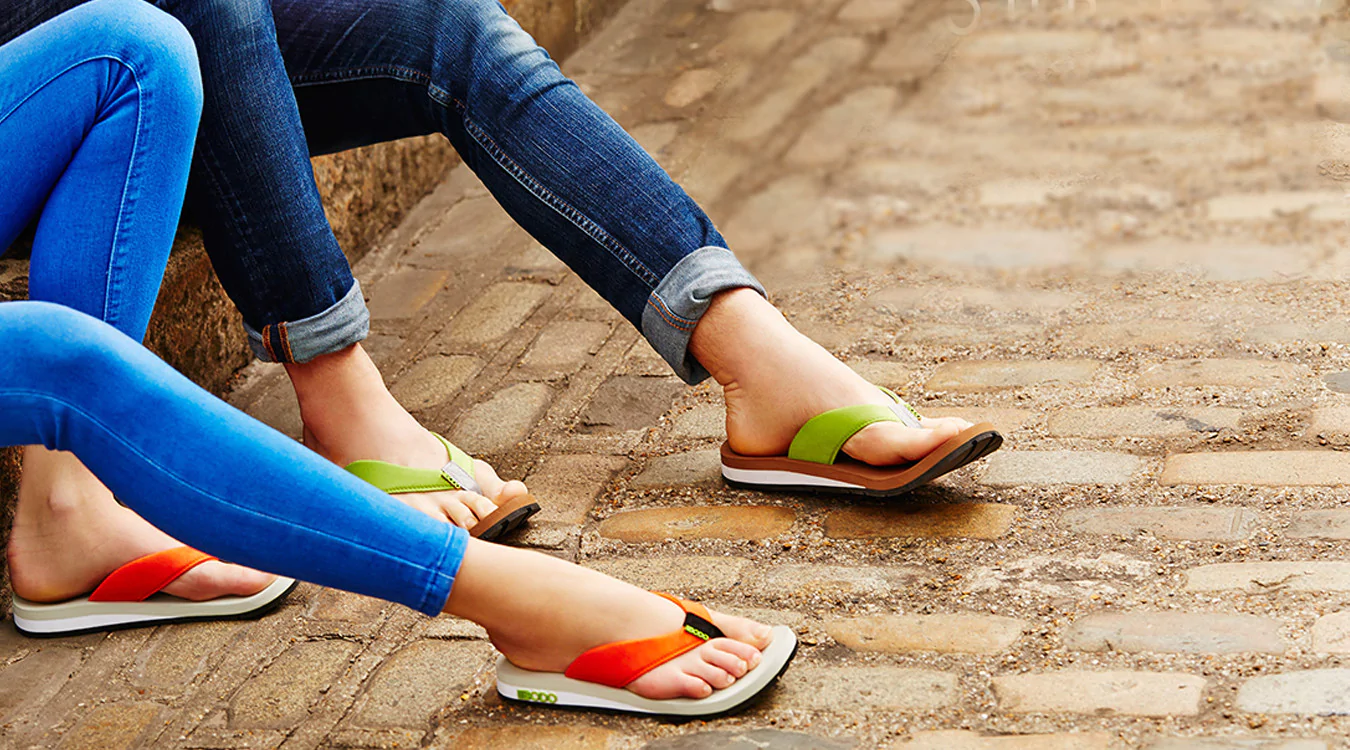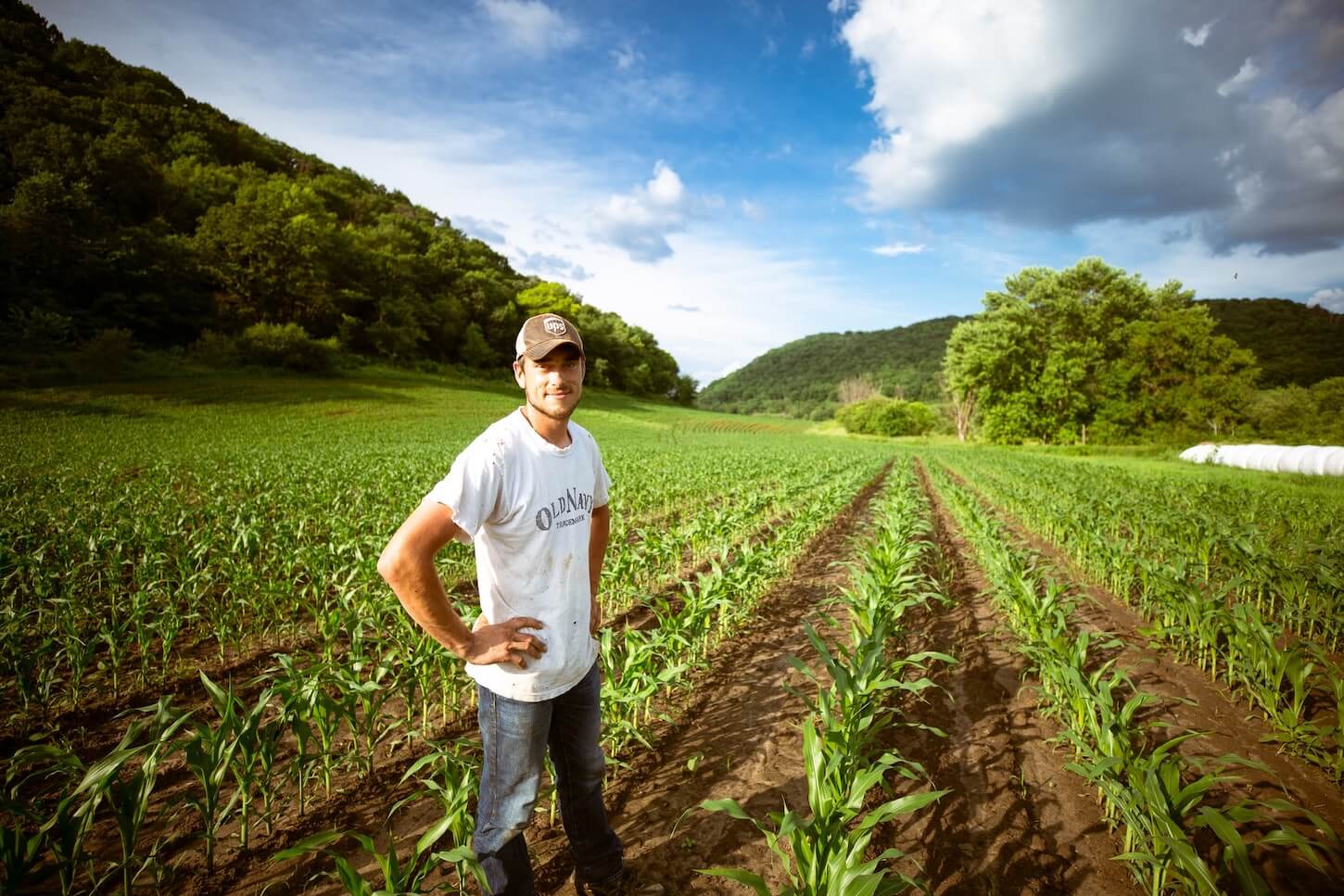There’s always a unique way to help those in need. A great example is Peter Lochan whose footwear is created from used car tyres. “We would like to influence Adidas, Puma, Nike, and all these other big footwear brands to do exactly the same thing,” describes Peter who founded the fascinating brand BODO in 2011.
The best part of Peter’s working life has been spent in professions where helping others has been his primary focus. Since 1989 he has been a member of the London Guardian angels, a safety patrol group based on the London Underground which has been acting as a visual deterrent towards violent crime. He was also responsible for setting up the 1st European Junior Angel group. Apart from voluntary work and successful business, he’s also working as Director of Employment Services and Employee Relations Representative.
Learn about his unique story in an exclusive interview for Gratitude.
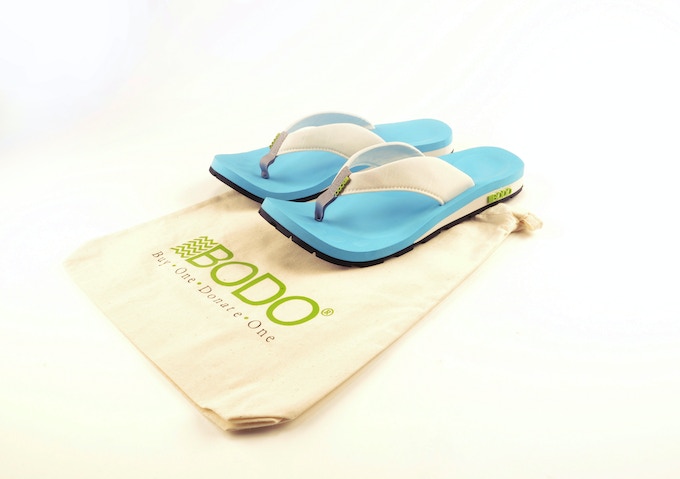
Can you describe to us the story that inspired your original business idea?
So BODO footwear is not by any means a brand new idea. The idea for me, was inspired by an uncle of mine who lived homeless on the twin islands of Trinidad and Tobago. And this was back in the sort of late fifties, early sixties. Trinidad at the time was an oil rich country.
And these oil field workers based a slipper slide on the oil filled heels and so on. So he had this ingenious idea regarding the used car tyres which were all around. And then he just quite simply nailed them to the very existing shoe. I grew up with this story from the age of seven, which was many years ago, and I’ve always had a thought about this. I’ve always had an aspiration about one day owning a footwear brand. Because I’m also a footwear collector.
I wanted to do something to combine footwear, as well as my own background and career unemployability. And I decided one day that the idea of putting car tyres onto shoes would be fantastic. I decided to create what we call a BODO sandal, BODO being the acronym for “buy one, donate one”. That’s how the company was actually born — through the development of using disused car tyres, which were turned into amazing items of footwear and each time a pair was purchased, a pair was donated to a person in need.
That’s amazing. And why do you want to make a change in the footwear?
The footwear industry at the moment seems to be controlled by many big players, to name a few, Adidas, Nike, the Clarks Shoes and so on.
And it doesn’t seem to be much done to give people the opportunity to have a sustainable living, or to develop their education through some of the countries where these footwear brands are actually being made. So places like Indonesia, Vietnam, Columbia and South America.
So one of the things that I wanted to do was to look at areas within these countries where development was very much needed. And in some of these countries, believe it or not, in today’s day, children are not able to enter into a classroom, if they do not have the right footwear or if they don’t have any footwear at all. The idea of limiting someone’s education on the basis that they don’t have shoes, without taking into consideration affordability, seems to me sort of ridiculous. But also and equally, people were not able to sustain employment working on some of these rough terrains in these countries. So I decided to come up with a given addition to my footwear brand.
Because I believe in helping people. It creates a circle — when I help somebody, that person will be able to help themselves, and therefore they will be able to help others through education, employment, and training.
That’s excellent. So what sustainability means to you in terms of your business practices?
Number of different things, really. Number one, it’s that sustainability has to be ultimately about giving, as far as BODO footwear goes as well. But it’s also taking into consideration the eco aspect of the world, as well, and where we are at the moment. It’s about being able to take on board an item, which has been discarded, and turn that into something which could be used many times over again.
One of the things that we say is that a car tyre, for example, is guaranteed for a minimum of 45,000 miles. And our footwear is actually made from the same car tyres. So we’ve also put that tag onto our footwear — if somebody’s able to walk 45,000 miles in our footwear, we guarantee in that footwear they’ll be able to do it.
And I’m really curious how many tyres are used for making one sandal?
Less than one, in fact, less than the proportion of one tyre.

Can you imagine having a business without this donation aspect? What does this charity element give you as a person?
No, I wouldn’t. If there was not the opportunity to make donations to those in need, BODO footwear would not be born.
I come from a background of unemployment where sometimes you have to work with some of the countries hardest to help people, countries being the United Kingdom in my situation. And I’ve spent many years working in various charity sectors. So I am programmed to offer either a donation or to offer support in any possible way I can. That is my passion in life. I’ve been doing voluntary work since the age of 16. And I’ve traveled through many countries doing voluntary work, as well. So, no, I couldn’t imagine it.
What is interesting is that your donation aspect is making those vulnerable and in need visible, as well as making visible the harmful impact of the current industry on the environment. Do people want to see those sad topics or do they prefer to avoid them?
When I initially set up BODO footwear, I took into consideration what people wanted to wear. I took into consideration their fashion conscious sense, their beliefs in giving back. I didn’t take into consideration what their thoughts were in relation to the car industry or whether they wanted to see that or not.
This was born out of my passion. I took a small idea and threw it to the world. And the response I’ve had back so far has been absolutely fantastic and amazing, in all aspects.
And in your experience, does buying your products motivate people to be even more conscious about other everyday life decisions?
We have various different customer groups. And yes, that does apply to some, but not to all, people make purchases for various different reasons.
Our footwear is designed for the fashion conscious. It’s also designed for those that believe in donation and giving, it is also designed for those who have an eco conscience, as well. People buy our footwear for various different reasons, but we would like to think that that would be the majority of the case.
Do you predict that other brands could follow your bright example in the concept of “buy one, donate one”? Are brands, in your opinion, these days interested in ESGs?
We would hope so. Again, BODO footwear wasn’t born out as just an idea solely restricted to ourselves.
It was born out of an idea that we wanted to disrupt and actually change the fashion industry. And I’m sure that there have been other organizations that have done the same. For our own research, we have found that there was a “buy one, donate one” football, not using the “buy one, donate one” tagline though.
There was a one footwear company called Toms, which operated very similar to the way that we do, there’s one for blankets — for every blanket purchase, the blanket is donated to a person in need. There’s one for baby clothing. There’s one for women’s personal items, as well.
We are not claiming to be the first in the world to offer the “buy one, donate one” model. We’re just taking an idea that already exists. And we’re throwing it out there to the world with a big way to say, well, look, you know what, if we can do this, so can you.
We would like to influence Adidas, Puma, Nikes, and all these other big footwear brands to do exactly the same thing. So slowly we are hoping to change the world.
That’s great. So in your opinion, are there enough brands out there that are honest about ESGs in their businesses or are those concepts sometimes also used for making just a profit?
They can be used to just be making a profit. But in the case of a lot of brands that are just solely for profit, I think the buying public are not ignorant, they are actually very, very smart. And they will have an idea of what social enterprise is, what is a charitable organization or what is a for profit organization.
With BODO footwear, we tend to promote exactly what we do. And we are completely transparent in all aspects of our business. To answer your original question, there’s never going to be enough companies that do this. There needs to be more and more and more of them.
We hope there will be. I’m also interested in your customers. Do you feel like you still need to educate them to become more conscious about their ecological footprint or do they approach your company being already aware about their impact on the environment?
A bit of both really. I think that it’s always good to have education, it’s something that has to be progressive and continuous. And even myself as well, every day that I’m working, every day that I’m out and about, I’m always learning new things, always.
We have a new generation of children coming up. And it’s amazing about the things that I learned from them, and what their thoughts and aspirations are. So no, I don’t believe that education stops. I believe that it’s something that has to be continuous. Not just for my buying public, but also for myself, as well.
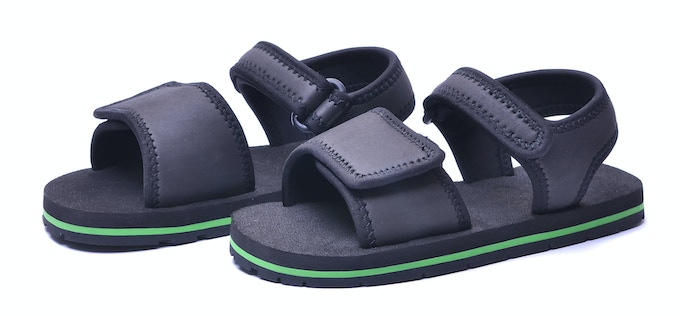
Could you tell us what age group typically buys your product?
It is quite strange. I have children, as young as eight, wearing the footwear which is something you never actually set out to do.
But then our age range in terms of what is being purchased seems to be anywhere between the age of 25 and 40. But we have a number of those, which are still in a university and which are buying our products, as well. Again, there is no restriction at all.
It is fashion that fits all for all ages, both men and women, and it comes in a variety of different colors. So I’m sure that regardless of age, background, or employment, we have a product that fits all.
And now I would like to learn a little bit more about yourself. So what do you think, what does it mean for you to be successful?
Everybody has a different idea of what success actually is. And I value happiness over success, success isn’t something I think about at all, it’s not important to me. What’s important for me is the need to be happy.
So I couldn’t tell you what success actually is but I could tell you what it means to be happy. In terms of my own personal life it means having a young daughter, having the most amazing friends, having a great support network around me, and a great team of people that I work on alongside.
But also being able and being given a chance to sort of set up a company like BODO footwear and take it to the world and try to make a difference in other people’s lives.
I think this idea that you have just introduced to us is really beautiful. And when we are talking about success in business, do you think it depends on how passionate people are about what they’re doing?
No, because I don’t think about it, it’s the honest answer. People have various different motives. I have a lot of people around me, or people that I come into contact with that will, say for example, consider success to have finances.
The problem is, finances are numbers and numbers go on forever. So in my opinion, those people are never ever going to be happy. And if you’re not happy, you’re not successful. But again, that is just my opinion.
And does helping vulnerable groups and protecting the environment make you feel more empowered?
It makes me feel part of a change. Not necessarily empowered, because the idea for BODO footwear is to ensure that everybody on the planet is wearing a pair of BODO sandals.
Now we will know that it’s not going to be possible. It’s a project that we’re working towards getting as many vulnerable people who require BODO footwear with what we are providing to them. But no, it’s not something I have a feeling about being empowered.
I feel in a lot of cases that I’m not doing enough. I want to be able to do more. Alongside BODO footwear, we’re about to also launch BODO bags. BODO bags are pretty much the same concept, it’s a “buy one, donate one”. We have created messenger bags made from the inner tubes of car tyres.
Believe it or not they actually still exist. And there are countries which have these pretty much all over the place. So for every bag purchased, a school bag will be donated to a child in need. But again, I still don’t believe that I am doing enough. I would like to do a lot more with the concept of using these used car tyres, as well as helping vulnerable people or those in need.
So basically, as you said, there is a huge amount of those in need and also causes that deserve more public attention. And I can imagine it must be really hard to choose the right concept for support. So how do you make a decision in your business?
I throw out an email pretty much to everyone and those that respond back, are those that I am able to actually work with.
One of the things I don’t want to do is force my concept upon others. So we offer invitations out to people, we research those organizations and we invite everybody to partner with BODO footwear, and those that agree to work with us, those are the ones that we try to support. So we don’t necessarily choose, we offer and they choose us.

And where do you find new ideas for your business?
As crazy as this is gonna sound, BODO footwear was literally born from a dream. I’ve always known about my uncle creating footwear that were made from car tyres. And I woke up one morning and couldn’t believe the dream that I had now. This is honestly true. I actually dreamt the name, I dreamt what the product was gonna look like, the colors that I wanted and I dreamt that I wanted footwear made from car tyres. I even dreamt of the partner donation, which I can’t really have.
It took me to get them, but I did all of that and it literally was a dream. So the first thing I did after this dream was that I went online and I purchased a domain name right there and then.
And that’s pretty much how it started, that’s how the ideas have been coming so far. If I’m being honest with you, it was like that with the BODO bags, as well — I was lying in bed at night and I was having this thought about what else can I do?
I didn’t even know that the inner tubes of car tyres still existed. And I started to do research because I thought, well, how am I gonna make a bag from a car tyre? It’s going to be too hard, it’s not going to be flexible. But when I started to do a bit of research, I realized that countries such as Thailand have huge amounts of stock of the inner tubes of car tyres, just sitting there and waiting to be destroyed.
So I thought, well, why not? Maybe I could do something with this. So I contacted a company in Thailand and they created something for me I wasn’t happy with. Then I found a company which created exactly what I wanted. So at the moment, we’re going through an agreement for manufacturing bags made from inner tubes of car tyres in El Salvador.
But honestly, the thoughts come from just dreams, ideas that I just placed into my mind right there and then. There is no magic solution to any of this. It’s not that I have a board of directors and we sit down and decide, what are we gonna do? We don’t need to do that. It honestly comes as natural as I just outlined.
That’s very inspiring. And what do you think are the qualities of the best business leader? How should they approach their company and their employees?
I think that would come down to what the business is.
But I always say this with my team, I actually work for my company. I certainly may have founded the idea, but I certainly didn’t provide the expertise behind it. I learn every single day from every aspect of the business itself.
That’s what worked for the organization that I built. But for other business leaders, I honestly couldn’t tell you. And again, I tend to focus more sort of upon BODO footwear, what we are doing as an organization, as opposed to what other companies are doing and how their sort of management team or their founders are actually running their businesses. It’s irrelevant to me if I’m being honest with you.
And in your experience, what factors are necessary to consider in order to make your employees motivated and feeling comfortable at work?
Oh, by quite simply being able to share information, advice and guidance at all aspects at all levels. And by being able to effectively as part of the team adapt to change.
And communication. Iit is as simple as that, it is just a basic human requirement. I think it is also very, very important to treat each person as an individual, and not as a product. But I also think that you have to have a genuine interest in people you work alongside, as well.
Do you have any personal motto that inspires you and that you can share with us?
No, not at all. I’m not a religious person, but I am faith led.
And I do believe that everything comes from within, it’s not something that you can manufacture and put into words. I don’t believe that would be a genuine way of describing what it is that I do. What I do is pretty much it is heartfelt. I work with vibration, with what feels right and with my gut instinct.
Did you always know what you wanted to do in your life?
No, not at all. I don’t make lifelong plans or even 10 year plans, or anything like that at all. I go by what feels right, what makes me feel happy.
When I was younger, I wanted to join the police force and become a police officer. That never materialized, however, I became a part of a New York based organization that acts as a visual deterrent to prevent violent crime from the New York subway, the London underground, the Paris Metro and a lot of these other countries that I’ve worked in. So although my path never led me to become a police officer, I fell into another organization which did very, very similar work.
And that took me all around the world and gave me the best education of my entire life, but that is something I didn’t plan on doing. BODO footwear, the concept of giving by donation, wasn’t something that was around in my era. So I never knew that I was going to do that. I never had a thought about setting up my own company.
Everything that I’ve fallen into, everything that I’m a part of today has happened, just through finding that way through happiness, I suppose, looking at aspects that make you happy and then following through with it. I didn’t make any life plans.
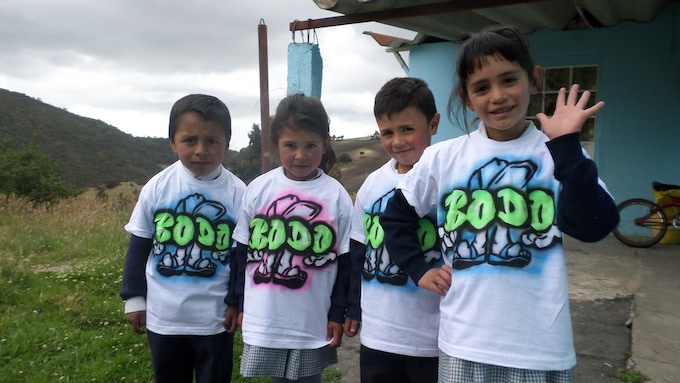
That’s interesting. So I would like to learn about the fact that you have some role models in your life.
Nobody that you would’ve ever heard of. Back in about 1984, I saw a documentary on TV about crime around the world and what countries were doing to combat crime, and also about one organization like that. And to me, being about 14 or 13 years old at that time, these guys looked like superheroes. So when I was 16 years old I decided to leave home. Not that my home was bad or anything like that at all, I was just in the mindset. I didn’t do great at school and I failed miserably at college. I realized then that the educational system was not going to be the one for me. I went to New York, at that time I had just turned 17, and I found this organization. Well, they found me in a sense, and God, 34 years later, I’m still part of the organization.
It is called the International Alliance of the Guardian Angels and it was founded by two people, a gentleman called Curtis Lewa and his wife at the time, Lisa Lewa. And quite simply what we do, we wear combat gear and red berets, and we patrol the London underground, the New York subway, and various other locations, in various different cities around the world. I don’t know why I joined, there was just something about it that I was instantly attracted to and wanting to be a part of.
When I first joined, I was very young, but I quickly rose through ranks. It became a part of my life. So I would say that gentleman Curtis Lewa and his wife Lisa Lewa were two great role models. When the organization came to London, the chapter leader of London, a gentleman called Colin Hatcher, again had a massive impact upon me.
And ultimately, a gentleman called Sebastian Mitch who came to London from Canada to set up the organization in London back in 1989, represented a massive influence in my life in a very positive way.
So my role models are nobody that you’ve ever heard of, I’ve never really been influenced by anyone on the screen or anyone in music. Instead, people who I’ve had the pleasure of meeting and people who I have had a genuine relationship with have been those who have inspired my life.
As you just mentioned, you have been preventing crimes in this organization for almost 34 years now. How do you set emotional boundaries to protect yourself from those emotionally difficult topics since you cannot help everyone?
Those who I come into contact with, I know that I can have a positive impact upon. When it comes to setting emotional barriers, it’s just like with every other human being, I guess it comes from experience.
And training does come alongside. While doing certain jobs there has to be a professional aspect to everything that you actually do. So to give an example, there may be a situation where you could be attacked for no reason at all, while doing your job. You’ve got two options: you can either retaliate in almost exactly the same way or you could try to do that in a very professional manner.
What you don’t want to do is put anybody else at risk at all in any way.
But it’s not always possible to have your professional training takeover. I don’t believe that any amount of training can prepare you for some life situations. Putting an emotional barrier on things doesn’t always work, there are times when you do become human, you remain human as they are.
You have to deal with things as professionally and as honestly as you possibly can, but I think one of the things that I tend to do is to take into consideration the person that I’m trying to assist, or the person I’m trying to work alongside, or the person that I’m trying to support, too. And put myself in the position of trying to understand what is going to be best for them, what is gonna be best for that individual. And I believe that that’s pretty much the only way that I can actually manage in that situation.
Apart from being part of Alliance of Guardian Angels and being CEO of BODO, you are also working as Director of Employment Services and Employee Relations Representative. How do you manage your time to make sure that you don’t neglect your health?
With difficulty, is the honest answer. I’m not gonna sit here and tell you, well, I have a secretary and she books me in for this and that. I definitely do not. I try to prioritize what is most needed and anything that I could put aside for a later date, I will. I do work from a diary, not always, but I tend to do that at least 80% of the time. I manage it effectively, but with great difficulty.
I can imagine since you have so many responsibilities, and especially if you really put yourself a hundred percent into those tasks, which I can hear in your passionate approach. So can you share with us what gives you the best fulfillment or compensation in your job?
I don’t really look for fulfillment or compensation. I am programmed a certain way to do a certain job, to work towards my understanding of what happiness actually is, and that’s it. As long as something feels good, then I will do it, so I guess if that’s what fulfillment is, then so be it.
But in terms of compensation, no, I don’t look for it. I genuinely am not money motivated. And you’ll see that from the car that I drive. I do get headhunted to take on board positions, which offer very attractive salaries, two most recently. But again, they weren’t right for me, for my vibration and how I manage my life. So I declined them.
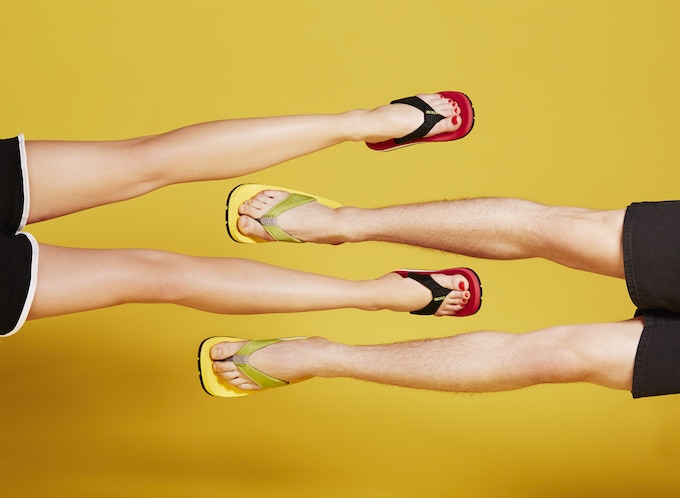
Can you also tell us what motivates you when you are close to burning out? Since you seem like a very busy person.
I don’t really burn out. If you enjoy what you do, that is motivation enough. And I enjoy absolutely everything that I do. If there’s something that I don’t enjoy, then I just won’t do it, I don’t see the point in doing that. I very rarely come across those situations.
I don’t put myself into a nine to five position. On some occasions I could put myself in, say from 5:00 AM to a midnight position, which I far more enjoy. It depends.
That’s a wonderful approach. And can you think of the best compliment that you got in your business?
No, because I don’t really look for them.
From a personal level, my daughter compliments me almost on a daily basis, so that’s great enough. And I take that as much as I can because I know once she becomes a teenager, that’s going to stop. In terms of business, as long as I know that people are showing an interest in BODO footwear, that’s a big enough compliment.
I get emails very often from people from all around the world. I have service level agreements with some fantastic and amazing organizations. So that is pretty much all that I can actually ask for. But whether somebody says that’s a great product, or whether somebody wants to buy a big stock of them, either way, the compliment is as equal to me.
Where would you like to grow and evolve more as a business leader and as an individual?
I haven’t thought about it. I don’t set long term goals. My short term goals will pretty much take me through the next 24 hours. Because again, I believe that things come naturally. I do believe in hard work, but I also believe in doing work that you actually enjoy, as well.
And that is the greatest reward. I feel that you can’t plan to grow, if you don’t know what the process is going to be. And the process for me is doing things that I actually enjoy. And I think that when you do things that you enjoy, you are going to naturally grow anyhow.
So it’s not that I haven’t thought about where I want to be or what plans I have for BODO. I want to carry on doing what we are doing, and I think the growth will happen naturally.
I would also like to learn a little bit more about what sustainability means to you in your personal life in general.
Being able to coexist with others, in all aspects, not just for the purpose of living. That is quite simply what sustainability is, in my opinion.
And in terms of talking about buying the products that are not harmful to the environment, what principles do you follow when you buy something?
I’m not a shopper, so it’s actually quite a difficult one to answer. I’m a regular shopper at thrift charity shops. I don’t actually have to be, but I choose to and I also prefer to buy from independence.
I mean, God, I drive a 17-year old car! So I’d rather go to an independent coffee shop, as opposed to, say, buying a costly coffee, for example. I believe in supporting small businesses, independent businesses, since I feel it helps organizations to grow.
And I’m hoping that people look at, say, BODO footwear against Nike, and make the same choices.

So when we go back to your business, why do you think transparency is important for your business?
Because I believe that the buying public or anybody that is spending hard earned money needs to know where their money is actually going.
That’s one of the reasons why I’m now bringing on board blockchain because I need my buying public to know where my product comes from, where it’s going to, the process it goes through, and what the end goal is actually going to be. And I think that when I was introduced to blockchain through Gratitude, I could see that it really gives all the answers. And it’s something that is almost imperative to BODO footwear now.
I can’t see a way for BODO footwear to exist and to progress without having blockchain technology through Gratitude. If, for example, I’ve gone into a second shop and bought a T-shirt, what would be really cool is if I knew where that T-shirt came from, whether it was from somebody who just wanted to pass on an item, whether it came from somebody that was deceased or maybe it came from somebody that had just outgrown clothing… It would be really cool to know that.
And likewise, after I am finished with that product and I re-donate it again, I’d like to know where that product is going to. I think it’s really important, knowledge wise, and also to know where your hard earned money is going, as well.
Of course. We are very happy that you are our newest client and we are very proud of this fact. Could you describe to us an example of a life story of a BODO sandal that is going to be soon displayed by Gratitude solution?
The plan is for people to be able to understand where the car tyre came from, i.e., which manufacturer, which country, where it was disposed of. Then the process of where that car tyre is going to, to then be broken down, to create the mold, to create the base of the footwear. And then when that footwear’s created, to which country it is going to be donated to. What I would like eventually, and I know that this is going to be something for the future, is to try and find a way to individually link that footwear to an individual.
At the moment I’m able to take it as far as the organization that I will be donating to. But I think it would be great to have that followed through to an individual and to see where they are within, say, the month period of having that footwear. Because again, remember the footwear is not just something that’s there to protect your feet and protect our precious planet.
It’s also helping other people to enter into education, either enter employment or sustain an employment. So that’s where I would like the blockchain to benefit the product. And again, working alongside Gratitude, I’m sure that we can make this happen eventually.
But at the moment this is what the life story is going to be — where the car tyre came from, the process, and where the end goal of that car tyre ends up.
Thank you, we’re very excited to hear that. And what do you think will be the future of footwear?
I would like it to be BODO — “buy one, donate one”. I would like it to be something where people bring on board products that could be recycled to create footwear. Now I know other companies are beginning to do this. For example, Adidas themselves have launched something using plastic waste from the ocean.
And they donate a percentage from their profit back into ocean life. That is absolutely fantastic. But I would like it to be BODO. However, at the moment I see that it’s going to remain where it is, until more and more companies like BODO footwear develop.
And my last question is something you basically already implied. Research has proven that transparency actually increases sales and business. Do you think that this blockchain solution could also help people distinguish which charities or donation causes are trustworthy?
Definitely. From my understanding, that’s the purpose of what blockchain is going to do. It is going to provide people with the answers to questions that they think about all the time. Myself included. I’m quite particular where I make donations to. I’ve worked for various charities and I understand how charities actually work. Some charities operate as a business with high salaries to certain individuals and I also understand that some charities donate literally the majority of that income out to supporting those that they’ve initially set themselves up for.
If people are unaware, blockchain is definitely something that will help them make these decisions. And hopefully it will actually elevate charities. In fact, not just charities, but organizations from all areas into developing even more business or more donations of a bigger buying public, better promotion, better marketing. So I think it’s very important and I believe that blockchain is absolutely fundamental now.

